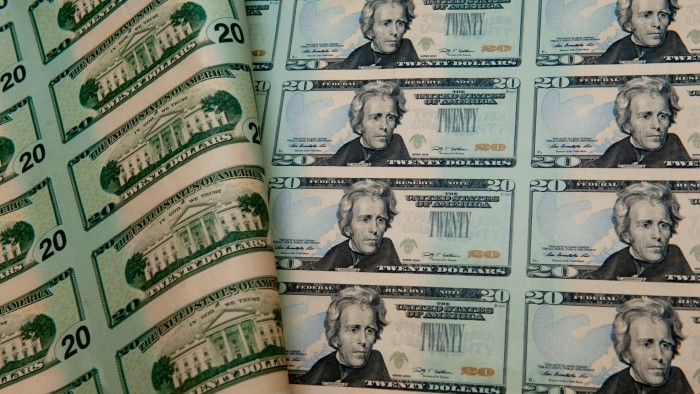Unlock the Editor’s Digest for free
Roula Khalaf, Editor of the FT, selects her favourite stories in this weekly newsletter.
The writer is chief economist at Goldman Sachs
I admit it: I often dodge questions about the dollar. A large body of academic literature and my own experience as an economic forecaster have taught me that predicting exchange rates is even harder than predicting growth, inflation and interest rates.
But with all due humility, I believe that the recent dollar depreciation of 5 per cent on a broad trade-weighted basis has considerably further to go.
Federal Reserve data shows that the real value of the dollar still stands nearly two standard deviations above its average since the start of the floating exchange rate era in 1973. The only two historical periods with similar valuation levels were the mid-1980s and the early 2000s. Both set the stage for depreciations of 25-30 per cent.
Combined with the ongoing portfolio flows into US assets and the outperformance of the country’s stocks, dollar appreciation has sharply boosted the share of the US in global investor portfolios. The IMF estimates that non-US investors now hold $22tn in US assets. This perhaps accounts for one-third of their combined portfolios — and half of this is in equities, which are often not currency hedged. A decision by non-US investors to reduce their US exposure would thus almost certainly result in significant dollar depreciation.
In fact, even reluctance by non-US investors to add to their US portfolios will probably weigh on the dollar. This is because balance of payments accounting implies that the US current account deficit of $1.1tn must be financed via a net capital inflow of $1.1tn per year. In theory, this could come via foreign purchases of US portfolio assets, foreign direct investment in the US, or US sales of foreign assets. In practice, however, most swings in the US current account balance correspond to swings in foreign purchases of US portfolio assets. If non-US investors don’t want to buy more US assets at their current prices, those prices must fall, the dollar must weaken, or (most likely) both.
These observations would not matter as much if the US economy were set to continue outperforming its peers, as it has for most of the past two decades. But this seems unlikely, at least for the next couple of years. At Goldman Sachs, we have recently cut our growth forecasts in all major economies on the back of the tariff shock, but nowhere more than for the US. We lowered our estimate of US growth in GDP from the fourth-quarter of 2024 to the same period this year to 0.5 per cent from 1 per cent. With GDP and corporate profits growing slowly at best, a sharp rise in measures of US policy uncertainty and questions about Fed independence, we expect non-US investors to curb their appetite for US assets.
Dollar depreciation should not be confused with loss of the dollar’s status as the world’s dominant currency. Barring extreme shocks, we think the dollar’s advantages as a global medium of exchange and store of value are too entrenched for other currencies to overcome. We have had large exchange rate moves without loss of the dollar’s dominant status in the past, and our baseline expectation is that the current move will be no different.
What are the economic consequences of a weaker dollar? First, it will exacerbate the tariff-related upward pressure on consumer prices. Tariffs alone are likely to push up core inflation — as measured by the Personal Consumption Expenditures Price Index — from 2.75 per cent now to 3.5 per cent later this year, and we estimate that dollar depreciation could add another 0.25 percentage point or so. While this is modest, dollar depreciation reinforces our view that the “incidence” of higher US tariffs will fall predominantly on American consumers, not foreign producers.
Recommended
Second, a weaker dollar not only raises import and consumer prices but also lowers export prices (measured in foreign currency). In the medium term, this relative price shift should help shrink the US trade deficit, one of the Trump administration’s goals. US policymakers are therefore unlikely to stand in the way of dollar depreciation, even without any type of “Mar-a-Lago accord”.
Third, a weaker dollar could, in principle, ease financial conditions and help keep the US economy out of recession. But the drivers of the depreciation matter. Reduced appetite for US assets, including Treasury securities, could offset the impact of a weaker currency on financial conditions.
In any case, the most important determinant of whether the US enters a recession is not the dollar. A decision to implement additional “reciprocal” tariffs following the current 90-day pause, an ongoing US-China trade war, or aggressive further goods-specific tariffs could make recession inevitable, no matter where the dollar goes.




